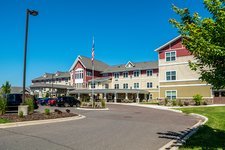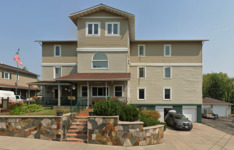Located at the northernmost tip of Wisconsin, lakeside city Superior has a comfortable, small-town feel. The city has a population of 25,977 people with an average percentage of seniors. It gets warm summers and very cold winters with heavy snowfall, making it ideal for those who like winter sports. Residents can go snowshoeing and skiing at Spirit Mountain Recreation Area or watch birds and waterfalls at Amnicon Falls State Park. Superior also has several cultural and historical sites, such as Fairlawn Mansion, a Victorian house converted into a museum and the Bong Veterans Historical Center.
In Superior, assisted living costs an average of $3,221 per month, which is lower than state and national averages. Wisconsin offers a couple of tax breaks for seniors that can help make retirement in Superior even more affordable.
Hundreds of thousands of American seniors utilize assisted living, a figure that is only growing. For these seniors, assisted living combines residential housing,assistance in daily activities, and some healthcare. These communities also strive to provide an atmosphere that is comfortable and engaging for their residents… Read More >
Assisted living in Superior costs an average of $3,221 per month. This is cheaper then the Wisconsin average of $4,400 and the national average of $4,300. Assisted living elsewhere in the region can be more affordable, with Michigan averaging $4,200, Minnesota averaging $4,283 and Iowa averaging $4,073. Illinois, however, is more expensive, at $4,575.
The Superior area has the lowest assisted living prices in the state. Green Bay has the second-lowest costs, at $3,800. Nearby Appleton has some of the highest prices, at $5,500 per month. Costs in Fond du Lac are closer to the state average, at $4,686. In central city Wausau, assisted living averages $4,100. Costs are higher in Milwaukee, at $5,073.
Note: Data for Superior was unavailable, so data for the nearest city, Duluth, Minnesota was used instead.
Seniors living in assisted living communities in Superior may be able to take advantage of the Family Care or Family Care Partnership programs. These Medicaid-based waivers offer financial assistance for similar services, including personal care, rehabilitative therapy and nursing, although medical care is included in the Family Care Partnership program. Read more about these waivers by visiting our Assisted Living in Wisconsin page.
| Contact | Description | |
| Senior Connections | (715) 394-3611 | Senior Connections serves adults over 60 in Douglas County. A benefit specialist can help seniors apply for health insurance and a health promotion program offers classes on fall prevention and chronic disease management. Seniors can also access a transportation initiative and a loan closet with assistive equipment like walkers and wheelchairs. |
| Lew Martin Senior Center | (715) 392-5127 | This senior center has low-impact exercise classes such as tai chi to help seniors stay fit. An activity calendar has regularly scheduled games, crafts and entertainment, and an aging mastery program offers education on financial planning and health. |
| Douglas County Veterans Service Office | (715) 395-1341 | Expert staff at this state-run agency can help veterans find and access benefits programs. Service members may be eligible for discount cards as well as state and federal financial aid for housing, medical care and education. A transportation program helps veterans get to and from medical appointments in the VA health care network. |
| American Association of Retired Persons | 1 (866) 448-3611 | Seniors can take part in a variety of educational opportunities, including defensive driving, financial planning and scam awareness courses. This organization also offers assistance with tax preparation and health benefits applications. The AARP also hosts special events throughout the year, which include live entertainment, lectures and movie nights. |
| Wisconsin Judicare | (715) 842-1681 | In addition to maintaining a resource center with self-help information, this nonprofit also offers free legal representation to low-income seniors. Elders can get help with legal issues related to health, housing and financial issues as well as preparing wills, estate plans and care directives. A low-income taxpayer clinic helps citizens resolve tax issues. |
The Wisconsin Department of Health Services is responsible for regulating assisted living communities in Superior. These communities must meet high standards for quality of care. Visit our Assisted Living in Wisconsin page to learn more about these regulations.





